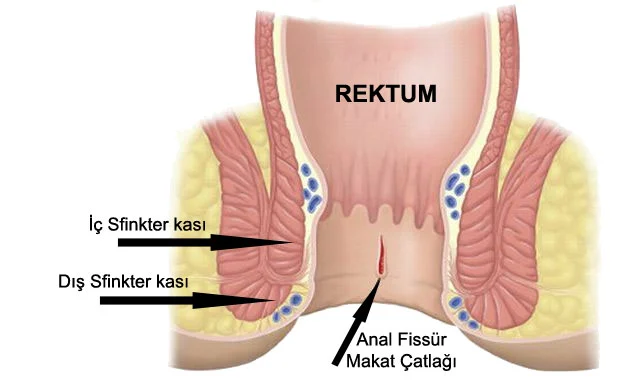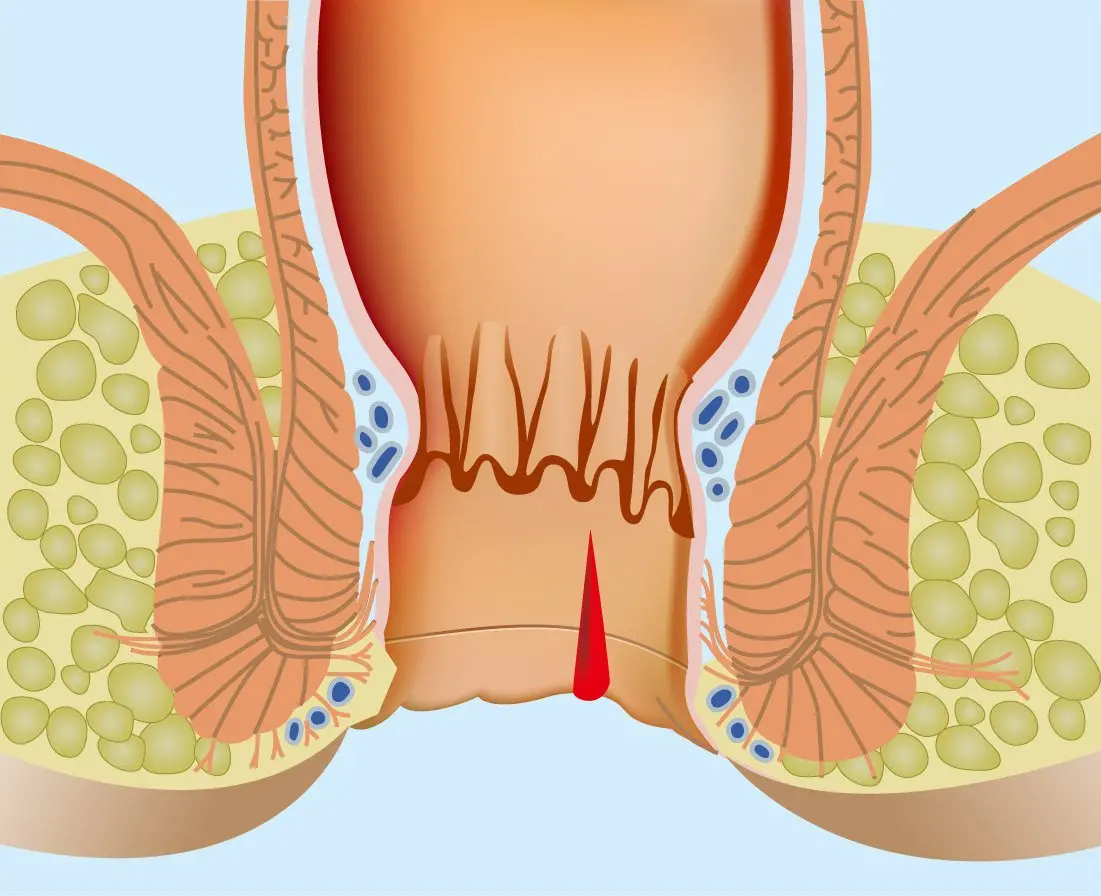
Contents
- What Is an Anal Fissure?
- Common Symptoms of Anal Fissure
- Causes of Anal Fissures
- Diagnosing Anal Fissures
- Treatment Options for Anal Fissures
- How Long Does Anal Fissure Treatment Take?
- Link Between Crohn’s Disease and Anal Fissures
- Importance of Accurate Diagnosis in Anal Conditions
- Anal Fissure Treatment Costs in Turkey
- Frequently Asked Questions (FAQ)

An anal fissure, commonly known as a rectal tear or anal crack, is a small tear in the lining of the anus. It is a highly painful condition and is often mistaken for hemorrhoids by patients. However, with accurate diagnosis and timely treatment, anal fissures can be fully healed. In this article, you will find comprehensive information about the symptoms, causes, and treatment options for anal fissures.
What Is an Anal Fissure?
In simple terms, a fissure is a small tear in the skin or mucosal lining. An anal fissure refers to a tear in the inner lining of the anus. It typically occurs due to excessive straining during bowel movements, hard stool, or after childbirth.
Common Symptoms of Anal Fissure
- Sharp and intense pain during defecation
- Burning sensation lasting hours after bowel movement
- Visible blood on toilet paper
- Itching around the anus
- Small skin tag near the tear in chronic cases
These symptoms significantly impact quality of life. If you experience any of them, consult a general surgeon promptly.
Causes of Anal Fissures
- The most common causes include:
- Chronic constipation and hard stool
- Prolonged episodes of diarrhea
- Excessive tightening of anal muscles
- Childbirth trauma
- Inflammatory bowel diseases like Crohn’s disease
- Trauma (e.g., anal intercourse)
Patients with Crohn’s disease often experience recurring fissures in the anal area.

Diagnosing Anal Fissures
Diagnosis is usually made through patient history and physical examination. When needed, anoscopy may be used to determine the fissure's location and severity. At our clinic in Turkey, experienced surgeons provide painless and rapid diagnosis followed by personalized treatment planning.
Difference Between Acute and Chronic Anal Fissures
| Feature | Acute Fissure | Chronic Fissure |
|---|---|---|
| Duration | Less than 6 weeks | More than 6 weeks |
| Appearance | Superficial, recent tear | Deep tear with skin tags on the edges |
| Treatment | Often heals with medications | May require surgical intervention |
Treatment Options for Anal Fissures
1. Medical Therapy
First-line treatment for acute fissures includes:
- Muscle relaxant creams (e.g., nitroglycerin, calcium channel blockers)
- Pain-relief ointments
- Warm sitz baths
These approaches reduce muscle spasms and promote healing.
2. Botox Injections
If medical therapy fails, Botulinum toxin (Botox) can be injected to temporarily relax the anal muscles. It’s a minimally invasive alternative to surgery.
3. Surgical Treatment
For chronic fissures, surgery may be necessary. The most effective procedure is:
Lateral internal sphincterotomy: Involves cutting a small part of the internal anal sphincter to relieve pressure and promote healing.
This procedure has a high success rate and offers long-term relief.
How Long Does Anal Fissure Treatment Take?
Treatment duration depends on the severity. Acute fissures often heal in a few weeks with medical therapy. Chronic fissures usually require surgery, with recovery in 2–4 weeks.
Link Between Crohn’s Disease and Anal Fissures
Inflammatory bowel diseases such as Crohn’s can lead to chronic anal fissures. In such patients, both the fissure and the underlying bowel condition should be managed carefully.
Importance of Accurate Diagnosis in Anal Conditions
Anal fissures share symptoms with hemorrhoids, anal abscess, and fistulas. Misdiagnosis can lead to unnecessary treatments and prolonged discomfort. A proper evaluation by a general surgeon is essential.
Anal Fissure Treatment Costs in Turkey
The cost of treatment varies depending on the fissure’s severity, the patient’s health condition, and the selected treatment option. Contact our clinic in Turkey for personalized consultation and detailed pricing.

Frequently Asked Questions (FAQ)
Can an anal fissure heal on its own?
Yes, early-stage acute fissures may heal with lifestyle changes and medication. Chronic fissures need medical intervention.
Is fissure treatment painful?
Modern treatment techniques involve minimal discomfort.
Is rectal bleeding always caused by fissures?
No, bleeding may also indicate hemorrhoids, polyps, or cancer. A medical assessment is crucial.
Is Botox effective for fissure treatment?
Yes, Botox helps relax the muscles and often eliminates the need for surgery.
![dr.leyla-arvas-800×1000.jpg[1] dr.leyla arvas](https://www.quartz.com.tr/wp-content/uploads/2024/11/dr.leyla-arvas-800x1000.jpg1_.webp)
Author : Op. Dr Leyla ARVAS
Dr Leyla Arvas is an internationally recognised specialist in aesthetic surgery based in Istanbul. Graduated in 1998 from Istanbul University Faculty of Medicine, she has developed her expertise by studying in Taiwan, Japan and Spain during her 20 years of experience.
This article March 3, 2026 was updated on
Editor: admin@quartz.com.tr


